Is Crypto Compensations and Salaries the Future of Payroll?
.avif)
The potential for employees to achieve greater autonomy through companies adopting cryptocurrency-based payroll systems in the future.
In today’s interconnected world, the rise of remote work has prompted a reevaluation of traditional payment methods. One question at the forefront of this evolution is whether remote workers can receive their salaries through cryptocurrencies. While direct crypto payments might not be universally accepted yet, innovative platforms like Ontop are reshaping the landscape by offering a unique solution that empowers workers with the freedom to transfer their earnings to their preferred crypto wallets.
Prior to commencing, we would like to acquaint you with essential information regarding cryptocurrency:

Now, let's delve into crucial aspects surrounding this intriguing shift:
Cryptocurrencies are gaining more traction year by year, as their popularity and acceptance continue to surge in various sectors. With increasing recognition from both individual and institutional investors, the decentralized nature and innovative features of cryptocurrencies contribute to their growing prominence in the global financial landscape. As advancements in blockchain technology unfold, the potential applications of cryptocurrencies are expanding, further solidifying their role as a transformative force in the evolving financial ecosystem.
fig 1.
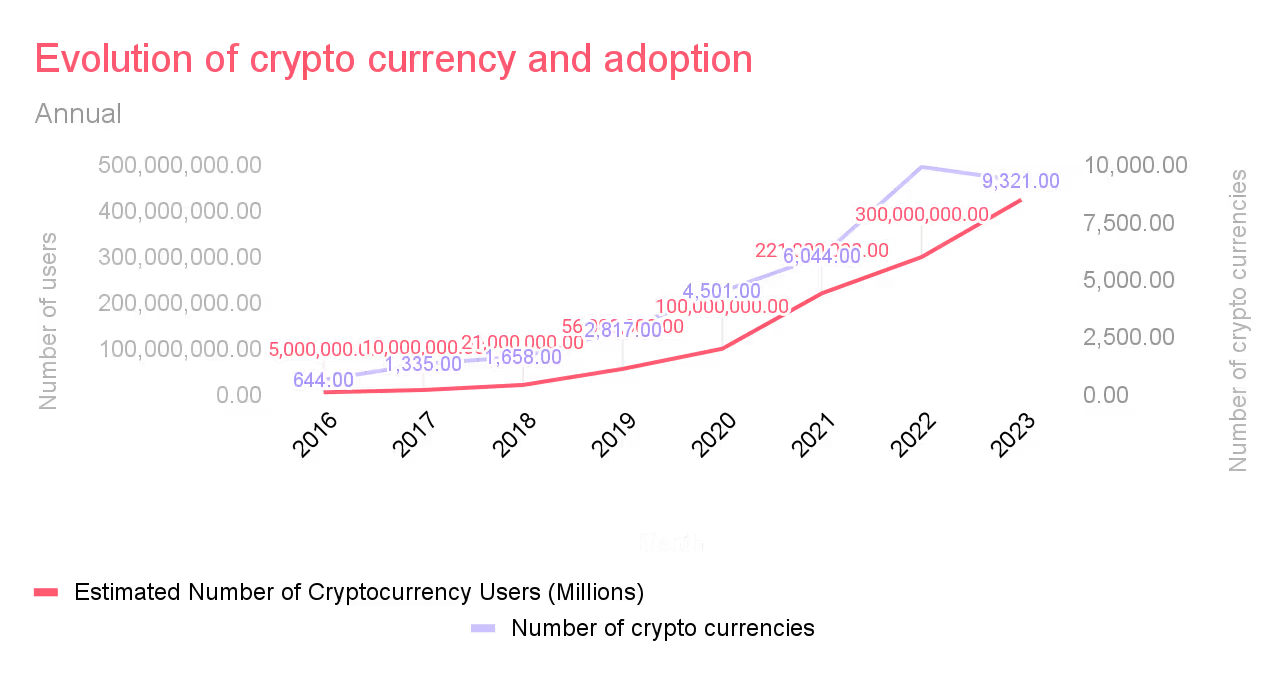
But the inherent volatility of cryptocurrencies poses a considerable challenge for their widespread adoption in conventional financial transactions. This unpredictability undermines the stability needed for cryptocurrencies to serve as a reliable foundation for wages and fringe benefits. The risk associated with accepting payments in crypto becomes evident as employees may find themselves in a precarious situation, facing the possibility of receiving compensation worth considerably less than their agreed-upon base salary. This volatility introduces an element of uncertainty that raises questions about the practicality and dependability of using cryptocurrencies for traditional financial arrangements, thereby highlighting the need for a more stable and consistent form of value exchange in the realm of employment compensation. The below chart has been made with a summary of annual information of the volatility index based in coinmarketcap information:
fig 2.
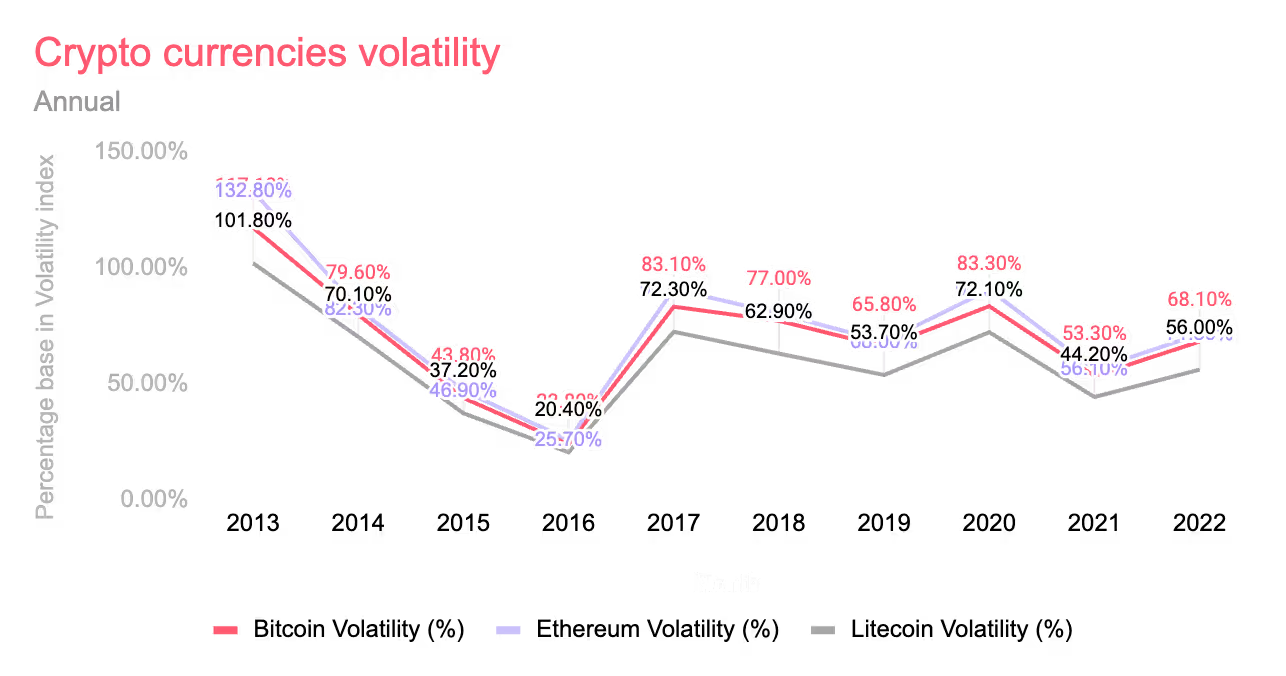
Ontop ©2023 . All Rights Reserved.
Despite the volatility associated with cryptocurrencies, they offer numerous advantages, particularly in the realm of the gig economy. One notable benefit is anonymity, as cryptocurrency transactions allow freelancers to receive payments without divulging personal information, catering to industries where privacy and security are paramount. Additionally, blockchain-based technology ensures contract enforcement without the need for intermediaries, playing a pivotal role in the gig economy's structure. Independence is another advantage, granting gig workers the flexibility to operate from various locations. The gig economy has witnessed a surge, providing individuals with the opportunity to earn additional income through the flexibility it offers. Cryptocurrency transactions further contribute to income generation by saving on lower commission fees.
Gig workers, including rideshare drivers and freelancers, have embraced cryptocurrencies like Ethereum and Bitcoin for various reasons, such as instant payments, global payment access, and protection against fraudulent transactions. The growth of cryptocurrency in the gig sector aligns with the modernization of disbursement methods, fostering digital money transactions.
In the context of crypto payroll, the advantages extend beyond the gig economy. Cryptocurrencies like Bitcoin, Ethereum, Litecoin, Solana, and Cardano provide fast and direct transactions with low fees, making them appealing for global workforces. The decentralized nature of crypto eliminates reliance on traditional financial institutions, offering security and permanence in transactions. Furthermore, crypto payments serve as an investment, with the potential for appreciation in value, providing employees the opportunity to accumulate more than their base salary. Despite the volatility inherent in cryptocurrencies, the allure of crypto payments is on the rise, with a significant percentage of the population familiar with digital assets. This growing awareness and the potential for increased value make crypto payroll an enticing option for both workers and companies, paving the way for innovative and flexible payment solutions in various sectors.
Presented below are summarized the benefits of cryptocurrency:
• Anonymity:
Cryptocurrency transactions offer significant advantages in terms of anonymity, allowing freelancers to receive payments without disclosing personal information. This feature is particularly beneficial in industries where privacy and security are paramount.
• Blockchain-based Independence:
Blockchain technology enforces contracts without the need for third-party intermediaries, playing a crucial role in the gig economy. Workers also benefit from the independence to work from various locations with flexibility.
• Income Generation:
Cryptocurrencies like Ethereum and Bitcoin provide gig and international workers with various advantages, including instant payments, global payment access, and protection against fraudulent transactions.
Crypto Payroll Specific Advantages:
Cryptocurrencies such as Bitcoin, Ethereum, Litecoin, Solana, and Cardano offer fast and direct transactions with low fees, making them appealing for global workforces.
The decentralized nature of crypto eliminates reliance on traditional financial institutions, ensuring security and permanence in transactions.
• Investment Potential: Crypto payments serve as an investment, with the potential for the value to appreciate over time.
Despite the volatility, crypto payroll provides employees with the opportunity to accumulate more than their base salary, presenting a unique financial incentive.
• Growing Awareness: Cryptocurrency awareness is on the rise, with a significant percentage of the population familiar with digital assets.
This increased awareness, coupled with the potential for increased value, makes crypto payroll an enticing option for both workers and companies, fostering innovative and flexible payment solutions across various sectors.
But also, we briefly outline some disadvantages:
• Trust/reputation: The pseudonymous nature of crypto user addresses contributes to a suspicious reputation, often linking cryptocurrencies to illicit activities like money laundering. Companies may refrain from participating in the bitcoin network to avoid potential reputational risks associated with the perceived association with illegal practices.
• Limited Global Acceptance: Varied cryptocurrency regulations across countries create challenges for establishing crypto payroll services on a global scale. Inconsistent terminology, rules, tax treatments, and regulatory changes make international transactions complex, hindering the widespread adoption of crypto in payroll systems.
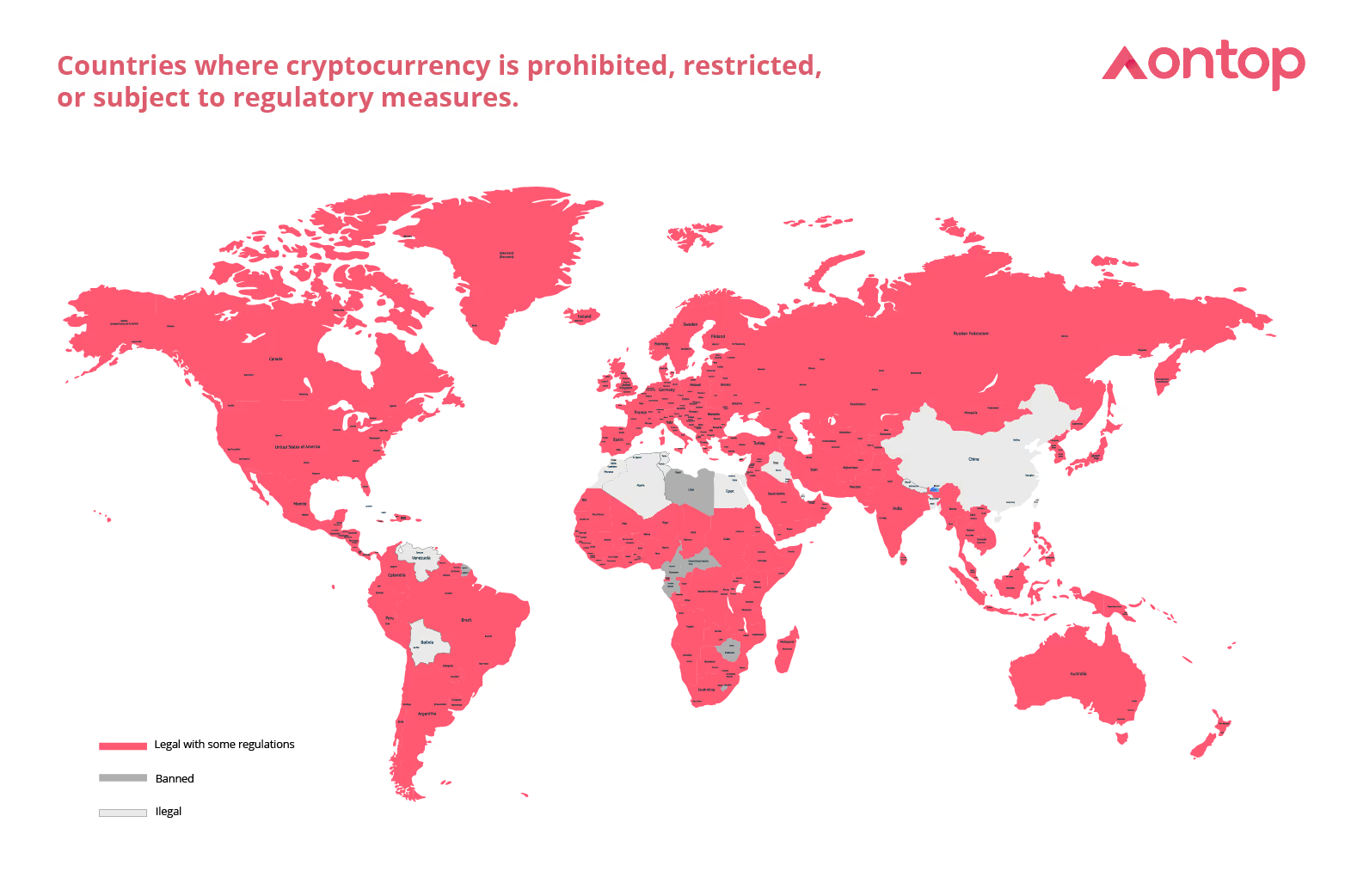
• Integration Challenges: Existing financial systems, such as credit cards and loans, have limited compatibility with crypto. The majority of banks do not support crypto transactions, making it challenging to integrate them into conventional legal money flows. This lack of integration poses usability limitations and complicates compliance with financial regulations.
• Tax Implications and Reporting Challenges: The IRS designates cryptocurrencies as property, not currencies, leading to tax implications and reporting considerations for both employees and employers. This designation introduces complexities such as the risk of forfeiture, withholding tax from wages, and the need for secure management and retention of cryptocurrencies on an organizational balance sheet.
• Organizational Risk Exposure: Acquiring and holding cryptocurrencies on an organizational balance sheet exposes the entity to risks from value fluctuations, especially with volatile cryptocurrencies like Bitcoin and Ether. Technical considerations are crucial to secure cryptocurrencies against cyber attacks and avoid self-inflicted problems, such as the loss of keys required for transactions.
However, choosing a smaller percentage of the salary in stable cryptocurrencies or exploring settlements in stablecoins can help reduce risk, all while retaining the advantages of swift settlements and minimal transaction fees. The increasing prevalence of stablecoins makes it increasingly feasible to manage personal finances in cryptocurrencies, with more individuals embracing this form of crypto (see Fig. 3).
fig 3.
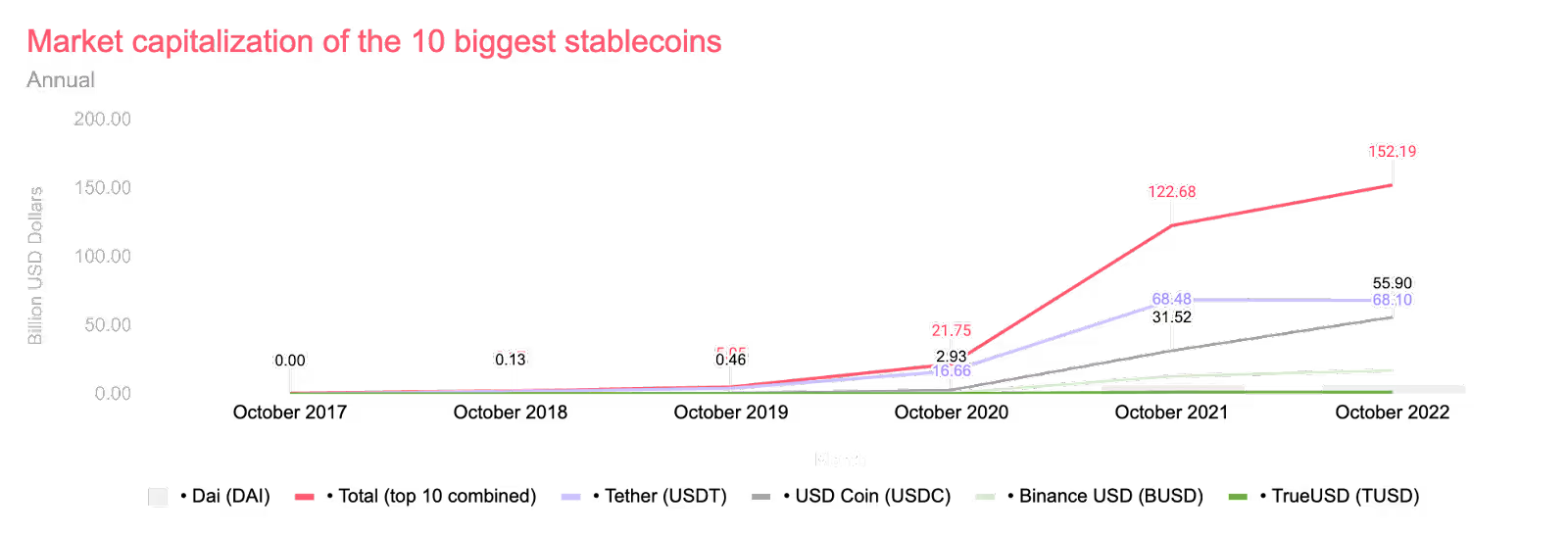
Today, several applications in our daily lives facilitate the adoption of stable coins and in general, crypto currencies. Here are some of the most widely used applications:
• Efficient Cross-Border Payments: Cryptocurrencies facilitate efficient cross-border transactions, offering a simpler, faster, and cost-effective alternative to traditional banking systems.
• Direct Tipping for Content Creators: Cryptocurrencies, with low transaction fees, enable users to make micropayments and tips to content creators.
• E-commerce and Shopping: Cryptocurrencies are increasingly accepted in e-commerce through digital wallets. Major companies like Microsoft, PayPal, Starbucks, Overstock, and AT&T enable global transactions, reducing costs and enhancing customer loyalty through crypto payments.
• Peer-to-Peer Transactions: Cryptocurrencies decentralize financial systems, allowing users to transact directly with peers. Blockchain's support for decentralized finance (DeFi) enables peer-to-peer financial interactions, though it comes with unique risks associated with this innovative approach.
• Native Spending and Earning: Cryptocurrencies native to blockchain ecosystems, such as MANA in Decentraland, facilitate spending and earning within specific platforms. Gamers can earn and use cryptocurrency in various games, and other blockchains like Filecoin, Axie Infinity, and Helium support native spending and earning.
• Participate in Blockchain Networks: Cryptocurrency holders actively participate in blockchain governance, network security, and transaction validation. Staking crypto tokens, agreeing not to trade or sell in exchange for earning interest, is a popular way to contribute to a blockchain ecosystem.
• Transaction Privacy: Cryptocurrencies like Dash, Monero, and Zcash prioritize transaction privacy, offering users enhanced confidentiality. This feature reduces the risk of fraud, identity theft, and protects sensitive information for both individuals and businesses.
• Yield Farming for Maximized Earnings: Yield farming, or liquidity mining, allows users to maximize interest income by strategically moving crypto assets to blockchain networks with the highest interest rates.
• Employee Payments: Cryptocurrencies serve as a means to remunerate both employees and contractors, a trend particularly notable in companies within the blockchain sector. These everyday applications underscore the adaptability of cryptocurrencies in personal financial management, providing solutions for cross-border transactions, direct compensation for content creation, online shopping, peer-to-peer transactions, native spending, active engagement in blockchain networks, transaction privacy, earning through yield farming, and even facilitating payroll services for global teams.
Regarding payroll specifically, an increasing number of workers worldwide are embracing cryptocurrencies each day (see fig 4.)
fig 4.
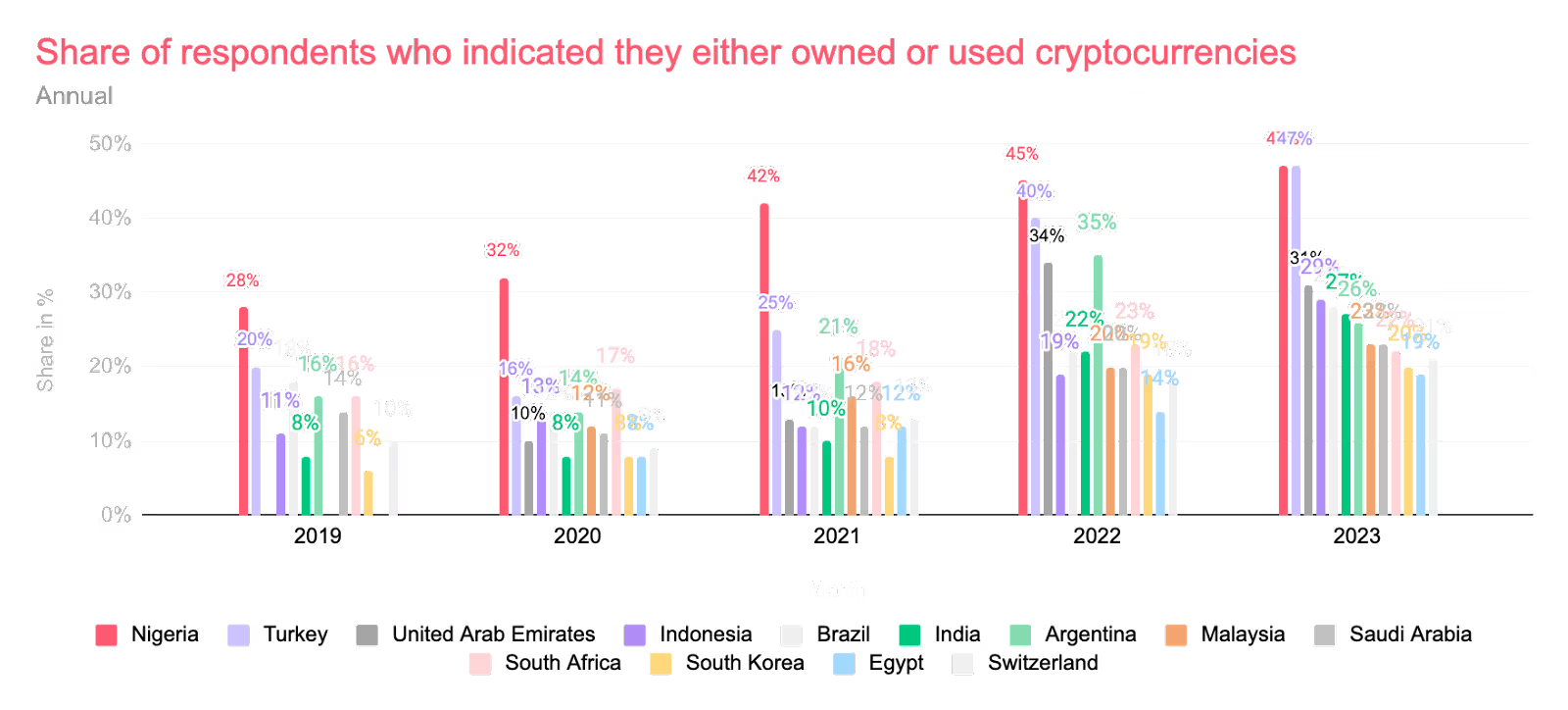
Now, if cryptocurrencies are increasingly being adopted, they bring advantages for workers such as security and reduced fees. Additionally, stablecoins present an opportunity to mitigate volatility risks, and one of their significant applications could be payroll payments. How would an international payroll payment look through crypto compared to USD? See Figure 5:
fig 5.

As A summary:
1. Cryptocurrencies are experiencing increasing adoption.
2. Payroll emerges as a potential application for cryptocurrencies.
3. Despite inherent disadvantages, stablecoins are enhancing the security landscape.
4. This has led to a growing acceptance of stablecoins in daily transactions.
5. Considering these developments, crypto salaries may become an enticing perk for workers in the future.
And as a conclusion:
Currently, as cryptocurrencies face legal limitations in some regions and exhibit high volatility, making compliant management challenging, one viable approach is to empower your employees to convert their salaries from fiat currency payroll into cryptocurrency. To address this, we offer a solution:
How to Pay Foreign Remote Workers with Ontop
Navigating international payroll can be a complex maze, especially when dealing with foreign remote workers. Ontop, a leading multi-country payroll platform, simplifies this process by providing companies with a seamless solution. Through Ontop’s intuitive interface, employers can effortlessly disburse salaries to their global workforce, ensuring compliance with diverse regulations and currencies across borders.
Can Workers Be Paid in Crypto?
While direct salary payments in cryptocurrencies might not yet be widespread due to regulatory complexities and varying company policies, Ontop offers a game-changing approach. Ontop enables remote workers to exercise their financial autonomy by allowing them to transfer their earnings to their preferred crypto wallets. Unlike other platforms constrained by limited crypto wallet options, Ontop stands out as a comprehensive solution, granting workers the liberty to choose their destination for crypto transactions.
A Taste of Freedom with Ontop
Ontop doesn’t just facilitate payments; it champions financial freedom. Remote workers using Ontop gain unprecedented control over their earnings. They can seamlessly convert their salaries into cryptocurrencies, fostering a sense of financial sovereignty. By embracing Ontop, workers experience a newfound flexibility, enabling them to explore diverse investment opportunities or simply manage their finances according to their preferences.
Ontop’s commitment to offering a complete solution for remote worker payments sets it apart in the realm of payroll platforms. While others restrict the choices of crypto wallets, Ontop empowers workers to transfer their earnings to any crypto wallet they desire. This freedom symbolizes a significant step towards embracing the evolving landscape of remote work payments.
In conclusion, while direct salary payments through cryptocurrencies might not be universally prevalent yet, platforms like Ontop are bridging the gap. They enable remote workers to navigate the complexities of international payments and embrace the potential of cryptocurrency by granting them the autonomy to choose their preferred crypto wallets. With Ontop, it's not just about payments; it’s about empowering individuals to control their financial destinies.
In the dynamic world of remote work, Ontop is not just a payroll platform; it’s a gateway to financial liberation.
Remember, the landscape of crypto payments is evolving. Always consult with legal and financial professionals for the most up-to-date guidance.
Bibliography:
fig 1.
blockchainreporter.net. “Crypto Market Analysis Q2, 2023: Examining Trends, Challenges, and Opportunities.” Cryptonews.net, 7 July 2023, cryptonews.net/news/analytics/21286454/. Accessed 19 Nov. 2023.
“Guest Post by BlockchainReporter: Crypto Market Recap, October 2023 | CoinMarketCap.” Coinmarketcap.com, coinmarketcap.com/community/articles/6553450f912f2d1b3b3a2016/. Accessed 19 Nov. 2023.
Team, Chainalysis. “Chainalysis: The 2023 Global Crypto Adoption Index.” Chainalysis, 12 Sept. 2023, www.chainalysis.com/blog/2023-global-crypto-adoption-index/.
fig 2.
“Crypto Volatility Index Historical Rates (CVI).” Investing.com, 26 July 2023, www.investing.com/indices/crypto-volatility-index-historical-data.
“Ethereum Price Today, ETH Live Marketcap, Chart, and Info.” CoinMarketCap, coinmarketcap.com/currencies/ethereum/historical-data/.
“Precio, Gráficos, Capitalización de Mercado de Litecoin (LTC).” CoinMarketCap, coinmarketcap.com/es/currencies/litecoin/historical-data/. Accessed 19 Nov. 2023.
fig 3.
Statista search department. “Stablecoin Market Cap 2017-2021.” Statista, www.statista.com/statistics/1255835/stablecoin-market-capitalization/.
fig 4.
Statista Search Department (2020) Cryptocurrency Adoption by Country 2020, Statista. www.statista.com/statistics/1202468/global-cryptocurrency-ownership/
fig 5.
Kapur, Rajat . “What to Know about How to Pay Salaries in Crypto.” Www.ey.com, 23 Mar. 2022, www.ey.com/en_us/tmt/blockchain-solutions-promote-digital-ecosystems/what-to-know-if-you-want-to-pay-employees-with-cryptocurrencies. Accessed 19 Nov. 2023.





.avif)


